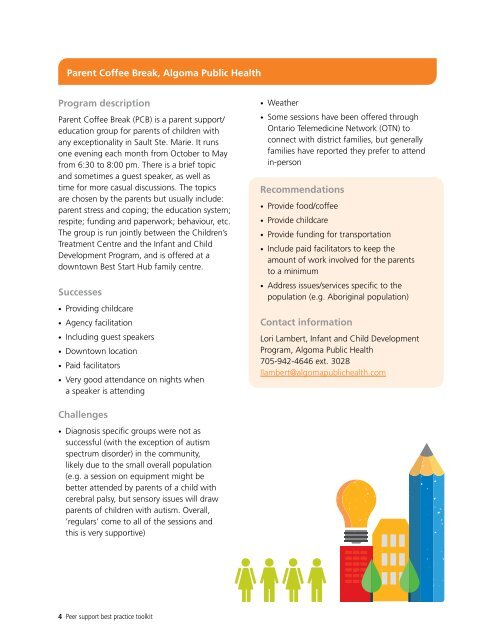Peer support
EtC_PeerSupport_Section2_FA
EtC_PeerSupport_Section2_FA
Create successful ePaper yourself
Turn your PDF publications into a flip-book with our unique Google optimized e-Paper software.
Parent Coffee Break, Algoma Public Health<br />
Program description<br />
Parent Coffee Break (PCB) is a parent <strong>support</strong>/<br />
education group for parents of children with<br />
any exceptionality in Sault Ste. Marie. It runs<br />
one evening each month from October to May<br />
from 6:30 to 8:00 pm. There is a brief topic<br />
and sometimes a guest speaker, as well as<br />
time for more casual discussions. The topics<br />
are chosen by the parents but usually include:<br />
parent stress and coping; the education system;<br />
respite; funding and paperwork; behaviour, etc.<br />
The group is run jointly between the Children’s<br />
Treatment Centre and the Infant and Child<br />
Development Program, and is offered at a<br />
downtown Best Start Hub family centre.<br />
Successes<br />
• Providing childcare<br />
• Agency facilitation<br />
• Including guest speakers<br />
• Downtown location<br />
• Paid facilitators<br />
• Very good attendance on nights when<br />
a speaker is attending<br />
• Weather<br />
• Some sessions have been offered through<br />
Ontario Telemedicine Network (OTN) to<br />
connect with district families, but generally<br />
families have reported they prefer to attend<br />
in-person<br />
Recommendations<br />
• Provide food/coffee<br />
• Provide childcare<br />
• Provide funding for transportation<br />
• Include paid facilitators to keep the<br />
amount of work involved for the parents<br />
to a minimum<br />
• Address issues/services specific to the<br />
population (e.g. Aboriginal population)<br />
Contact information<br />
Lori Lambert, Infant and Child Development<br />
Program, Algoma Public Health<br />
705-942-4646 ext. 3028<br />
llambert@algomapublichealth.com<br />
Challenges<br />
• Diagnosis specific groups were not as<br />
successful (with the exception of autism<br />
spectrum disorder) in the community,<br />
likely due to the small overall population<br />
(e.g. a session on equipment might be<br />
better attended by parents of a child with<br />
cerebral palsy, but sensory issues will draw<br />
parents of children with autism. Overall,<br />
‘regulars’ come to all of the sessions and<br />
this is very <strong>support</strong>ive)<br />
4 <strong>Peer</strong> <strong>support</strong> best practice toolkit


